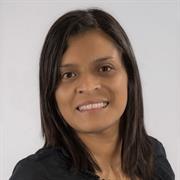
Dr. Glenda Mejia
Details
-
Department: School of GUSS
-
Campus: City Campus Australia
-
glenda.mejia@rmit.edu.au
-
ORCID: 0000-0003-2913-3854
Open to
- Masters Research or PhD student supervision
- Collaborative projects
About
These days, Glenda lives, moves, un/learns, works, and breathes on the traditional lands of the Kulin Nation. She was born in Kuskatan, known as El Salvador, and raised between lines: Kuskatan, Jagera Country, Meajin Country, and Naarm. She uses the pronouns she/her/hers/ella. She completed her PhD at The University of Queensland, Brisbane.
Glenda is a cultural geographer, scholar and educator, and her work and un/learnings focus on feminismos descoloniales from Abya Yala, migration/displacement entangled with memory, and sensing-thinking pedagogy. As a co-member of archiving the present, Glenda collaborates in various community-based programs such as: Náhuat Saturday School and SHELF in which she collaborated with Arts Gen to develop a community curated library, with the focus on Central American texts.
Glenda is a facilitator and community engaged collaborator with over 20 years of experience working with different communities from Latin American countries in so-called Australia. She is currently an Associate Professor in the Global Language Studies program at RMIT University, and one of the few scholars in Australia to have published extensively on topics related to the Spanish-speaking community in Australia such as belonging, memory, and displacement. As a lifelong learner, educator and scholar, Glenda is committed to un/re/learning and teaching by engaging and embodying a praxis of senti-pensante pedagogies. Her ethics, teaching, and work are inspired by Gloria Anzaldúa and bell hooks.
Grants and awards
2024–2025: Creative Australia Grant. Salvadorian displacement: an illustrated bilingual e-publication
2024: Adobe x Creative Curriculum Grant, Diversity, and Inclusion in a digital Spanish book
2014: Award for Teaching Excellence, Higher Education (College of Design and Social Context)
2014–2015: DEEWR Study Overseas Short Term Mobility to La Salle University, Mexico
2011: DEEWR Study Overseas Short Term Mobility Program Study to Javariana University, Colombia
2009: Transition Funding, RMIT University. Aim: to develop listening material for various levels of Spanish
2007: Transition Funding, RMIT University. Aim: to develop a course for the students to prepare for the Spanish Proficiency Test (DELE)
2003: Graduate School Research Travel Award, The University of Queensland, St Lucia campus
2002: Philology Scholarship, Department of Romance Languages, The University of Queensland, St Lucia campus
2002: Nominated for Dean's List Most Effective Teacher Award, The University of Queensland, St Lucia campus
Research fields
- 3901 Curriculum and pedagogy
- 440303 Migration
- 4406 Human geography
- 47 Language, communication and culture
- 470212 Multicultural, intercultural and cross-cultural studies
- 360501 Cinema studies
UN sustainable development goals
- 10 Reduced Inequalities
- 15 Life on Land
- 16 Peace, Justice and Strong Institutions
- 4 Quality Education
- 3 Good Health and Well Being
Academic positions
- Associate Professor
- RMIT University
- Melbourne, Australia
- 1 Jan 2026 – Present
- Convenor of Language Studies
- RMIT University
- School of Global, Urban and Social Studies
- Melbourne, Australia
- Jul 2024 – Oct 2024
- Senior Lecturer
- RMIT University
- Melbourne, Australia
- 1 Jan 2016 – 31 Dec 2025
- Program Director-Diploma of Languages
- RMIT University
- Melbourne, Australia
- 1 Jan 2014 – 30 Dec 2016
- Director Spanish Resource Centre
- RMIT University
- Melbourne, Australia
- 2 Jan 2012 – Dec 2024
- Convenor of Spanish Studies
- RMIT University
- Melbourne, Australia
- 1 Jan 2007 – Dec 2022
- Lecturer A - Spanish
- Griffith University
- Brisbane, Australia
- 2 Jan 2006 – 29 Dec 2006
Non-academic positions
- Grant Aid Community Worker
- Lifeline
- Brisbane, Australia
- 1 Feb 1996 – 31 Dec 1998
Supervisor projects
- Gender-Based Violence and Economic Empowerment: Comparative Analysis between Colombia and Australia
- 18 Dec 2024
- Japanese Learners' Memoirs: Reconfiguration of L2 Japanese learners identity and sense of self
- 21 Jul 2024
- Feminist Digital Media Politics in Latin America: a counterhegemonic space of gender activism.
- 12 Jul 2024
- The Foreign Language Teacher as a Transformative Intellectual: A Collaborative Space for Critical Practice in the Classroom
- 29 Jan 2024
- The Tale of Two Slums: The Collective Role of the Urban Poor in Improving Livability of Settlements: Cases from a West African City.
- 22 Aug 2023
- The harms of Child Protection against Aboriginal and Torres Strait Islander women and their children.
- 9 Jun 2023
- Latin American Mobile Subjects in Australia: Sense of Place and Critical Intercultural Digital Literacies
- 21 Nov 2022
- Pathways and Barriers to Mental Health Services Utilisation among Croatia- and Bosnia and Herzegovina-born Migrants in Melbourne, Australia
- 20 Nov 2020
- Who Cares in Australia? Gender, Ethnicity and the Occupational Transitions of Skilled Migrant Care Workers
- 9 Oct 2020
- What Stratum are you? Narratives of Colombian Migrants Living in Melbourne and how they Experience Socio-economic Stratification
- 28 Nov 2019
- Mental Health Literacy in the Arabic-speaking Community of Victoria
- 19 May 2017
Teaching interests
• Latin American Migration & Displacement to Australia (Memory & Place-Making)
• Pedagogy and Decolonisation (Creative practices and Community practices)
• Sociolinguistics (Language and Identity)
Research interests
Migration, Displacement, Cultural Studies, Language Studies, Memory, Cultural Geography, Pedagogy


